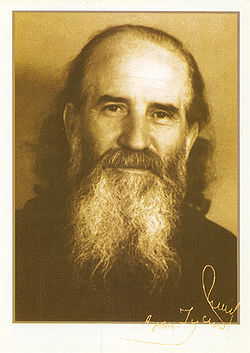Him, with all eternal and incorruptible divine riches.
14 Ιουνίου 2010
The newly-glorified St Justin of Ćelije writes the following in his work, The Orthodox Church and Ecumenism:
The hierarchy, in all its theanthropic values and dimensions, comes essentially from the eternal High Priest, the priest forever (Ps. 109:4), the Theanthropos, the Lord Christ, the Second Person of the Holy Trinity. Theanthropy is, therefore, the essence and criterion of hierarchy. It is from Him and He is in it (cf. Eph. 4:11-13). For this reason, He identifies Himself with it as He says to the holy apostles: He that heareth you heareth Me; and he that despiseth you despiseth Me… And, lo, I am with you always, even unto the end of the world (Lk. 10:16; Matt 28:20). Where the Theanthropos, the Lord Christ, the eternal High Priest is, there is the hierarchy and there the eternal priesthood (cf. Heb. 7:21-27). The Church, as Christ the Theanthropos, is indeed the only true possessor and guardian of the eternal, theanthropic priesthood and hierarchy which, though the holy mysteries, unceasingly pours forth all the divine powers that men require for piety, for theanthropic life in both this world and the next, for deification, for becoming like the God-Man (cf. II Pet. 1:2-4). This all comes to pass naturally and logically in the Church as the theanthropic Body, the organism, in which the laws of the Head, the Lord Jesus the Theanthropos, are supreme. This truth in apostolic-patristic Tradition therefore prevails: «The bishop is in the Church and the Church in the bishop.» [1] And again: «Where Christ is, there is the Universal Church.» [2] Saint Ignatius the God-bearer, a disciple of the apostles, commands the Christians: «Respect the deacons, all of you, as Jesus Christ, the bishop as being a type of the Father, the priests as God’s council, as the company of the apostles. Without these, one cannot speak of a Church.»
Both as an organism and as an organization, the Church is in all respects a unique being in our earthly world. It is, as an organism, theanthropic: the Lord Jesus Christ Himself perpetuated through all ages and all eternities. As an organization, it is a theanthropic organization of clergy and laity, as well as having other earthly characteristics. The Theanthropos and divine humanity are the supreme value and standard throughout. The Theanthropos is always the only Head of the Church as an organization. Where He, the God-Man, is replaced by a man, even if he is a hundred times infallible, there the God-Man is beheaded and the Church is no more. The theanthropic, apostolic hierarchy disappears, and along with it apostolic primacy and succession.
The holy Tradition of the holy Orthodox Church, in its entirety, is Christ the Theanthrop0s Himself. What could men add to holy Tradition, to Christ the all-perfect Theanthropos? In comparison with the supreme riches of the Theanthropos, all men of all times on this planet of God’s, and every man in particular, are mere paupers. They are mere paupers who have, through sin, completely impoverished themselves by death, which deprives them of everything divine, heavenly, immortal and eternal. And the supremely rich and merciful Lord Christ endows every man, in exchange for apostolic faith in Him, with all eternal and incorruptible divine riches: eternal truth, justice, love, life and everything that only the God of love, the only true Philanthropos, can give to man. For this reason, there is only one true grace and one immortal joy for human beings in all the worlds: the Theanthropos the Lord Jesus Christ. In Him lies the whole mystery of both God and man. Great and sweet is the mystery of our faith, our piety: God was manifest in the flesh (cf. I Tim 3:16). For all these reasons, the wondrous Lord Christ, the Theanthropos, is the one thing needful to a man and to mankind in all worlds, visible and invisible (cf. Lk. 10:42).






